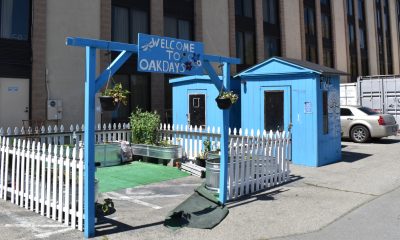Business
This Summer’s Travel Bummer: No Free Hotel Wi-Fi

Portland Marriott Downtown Waterfront is shown Wednesday, April 20, 2011, in Portland, Ore. (AP Photo)
(CBS News) – As travelers hit the road this summer, some might be in for a rude surprise when they check into their hotels: no free Wi-Fi.
Wi-Fi has become one of those staples, like clean linens and spotless bathrooms, that travelers simply expect when from a hotel, but that’s not always the case. Ironically, the more expensive a hotel is, the less likely it may be to offer free Wi-Fi, which may be because the management feels its better-heeled clientele can afford to pay up for Internet connectivity.
Yet that might be a short-sighted approach to hostelry, based on a May survey from online booking service Hotels.com. The site found complementary Wi-Fi is what more travelers look for than any other feature when booking a leisure stay. Six out of 10 respondents said they wish free Wi-Fi would become standard at all hotels in 2015.
“We know that free Wi-Fi has been the most sought-after amenity since we began doing our annual amenities survey in 2012,” Taylor Cole, a travel expert for Hotels.com, wrote in an email to CBS MoneyWatch. “While the demand for free Wi-Fi remains, it appears that it’s starting to become more of an expected offering than a differentiating benefit.”
Activism
OP-ED: AB 1349 Puts Corporate Power Over Community
Since Ticketmaster and Live Nation merged in 2010, ticket prices have jumped more than 150 percent. Activities that once fit a family’s budget now take significant disposable income that most working families simply don’t have. The problem is compounded by a system that has tilted access toward the wealthy and white-collar workers. If you have a fancy credit card, you get “presale access,” and if you work in an office instead of a warehouse, you might be able to wait in an online queue to buy a ticket. Access now means privilege.

By Bishop Joseph Simmons, Senior Pastor, Greater St. Paul Baptist Church, Oakland
As a pastor, I believe in the power that a sense of community can have on improving people’s lives. Live events are one of the few places where people from different backgrounds and ages can share the same space and experience – where construction workers sit next to lawyers at a concert, and teenagers enjoy a basketball game with their grandparents. Yet, over the past decade, I’ve witnessed these experiences – the concerts, games, and cultural events where we gather – become increasingly unaffordable, and it is a shame.
These moments of connection matter as they form part of the fabric that holds communities together. But that fabric is fraying because of Ticketmaster/Live Nation’s unchecked control over access to live events. Unfortunately, AB 1349 would only further entrench their corporate power over our spaces.
Since Ticketmaster and Live Nation merged in 2010, ticket prices have jumped more than 150 percent. Activities that once fit a family’s budget now take significant disposable income that most working families simply don’t have. The problem is compounded by a system that has tilted access toward the wealthy and white-collar workers. If you have a fancy credit card, you get “presale access,” and if you work in an office instead of a warehouse, you might be able to wait in an online queue to buy a ticket. Access now means privilege.
Power over live events is concentrated in a single corporate entity, and this regime operates without transparency or accountability – much like a dictator. Ticketmaster controls 80 percent of first-sale tickets and nearly a third of resale tickets, but they still want more. More power, more control for Ticketmaster means higher prices and less access for consumers. It’s the agenda they are pushing nationally, with the help of former Trump political operatives, who are quietly trying to undo the antitrust lawsuit launched against Ticketmaster/Live Nation under President Biden’s DOJ.
That’s why I’m deeply concerned about AB 1349 in its current form. Rather than reining in Ticketmaster’s power, the bill risks strengthening it, aligning with Trump. AB 1349 gives Ticketmaster the ability to control a consumer’s ticket forever by granting Ticketmaster’s regime new powers in state law to prevent consumers from reselling or giving away their tickets. It also creates new pathways for Ticketmaster to discriminate and retaliate against consumers who choose to shop around for the best service and fees on resale platforms that aren’t yet controlled by Ticketmaster. These provisions are anti-consumer and anti-democratic.
California has an opportunity to stand with consumers, to demand transparency, and to restore genuine competition in this industry. But that requires legislation developed with input from the community and faith leaders, not proposals backed by the very company causing the harm.
Will our laws reflect fairness, inclusion, and accountability? Or will we let corporate interests tighten their grip on spaces that should belong to everyone? I, for one, support the former and encourage the California Legislature to reject AB 1349 outright or amend it to remove any provisions that expand Ticketmaster’s control. I also urge community members to contact their representatives and advocate for accessible, inclusive live events for all Californians. Let’s work together to ensure these gathering spaces remain open and welcoming to everyone, regardless of income or background.
Activism
Oakland Post: Week of December 31, 2025 – January 6, 2026
The printed Weekly Edition of the Oakland Post: Week of – December 31, 2025 – January 6, 2026

To enlarge your view of this issue, use the slider, magnifying glass icon or full page icon in the lower right corner of the browser window.
Activism
Big God Ministry Gives Away Toys in Marin City
Pastor Hall also gave a message of encouragement to the crowd, thanking Jesus for the “best year of their lives.” He asked each of the children what they wanted to be when they grow up.

By Godfrey Lee
Big God Ministries, pastored by David Hall, gave toys to the children in Marin City on Monday, Dec. 15, on the lawn near the corner of Drake Avenue and Donahue Street.
Pastor Hall also gave a message of encouragement to the crowd, thanking Jesus for the “best year of their lives.” He asked each of the children what they wanted to be when they grew up.
Around 75 parents and children were there to receive the presents, which consisted mainly of Gideon Bibles, Cat in the Hat pillows, Barbie dolls, Tonka trucks, and Lego building sets.
A half dozen volunteers from the Big God Ministry, including Donnie Roary, helped to set up the tables for the toy giveaway. The worship music was sung by Ruby Friedman, Keri Carpenter, and Jake Monaghan, who also played the accordion.
Big God Ministries meets on Sundays at 10 a.m. at the Mill Valley Community Center, 180 Camino Alto, Mill Valley, CA Their phone number is (415) 797-2567.
-

 Activism4 weeks ago
Activism4 weeks agoDesmond Gumbs — Visionary Founder, Mentor, and Builder of Opportunity
-

 Activism4 weeks ago
Activism4 weeks agoFamilies Across the U.S. Are Facing an ‘Affordability Crisis,’ Says United Way Bay Area
-

 Alameda County4 weeks ago
Alameda County4 weeks agoOakland Council Expands Citywide Security Cameras Despite Major Opposition
-

 Alameda County4 weeks ago
Alameda County4 weeks agoBling It On: Holiday Lights Brighten Dark Nights All Around the Bay
-

 Activism4 weeks ago
Activism4 weeks agoBlack Arts Movement Business District Named New Cultural District in California
-

 Activism4 weeks ago
Activism4 weeks agoLu Lu’s House is Not Just Toying Around with the Community
-

 Activism4 weeks ago
Activism4 weeks agoOakland Post: Week of December 17 – 23, 2025
-

 Black History3 weeks ago
Black History3 weeks agoAlfred Cralle: Inventor of the Ice Cream Scoop






















































